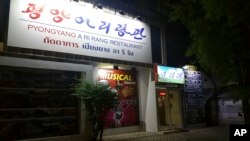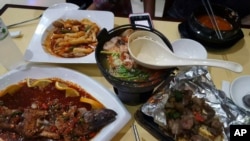North Korea is gathering information from foreigners, mostly South Koreans, through its global network of restaurants, a former worker of a North Korean restaurant abroad told VOA.
North Korea reportedly runs about 130 restaurants around the world, mostly in China. They serve traditional North Korean dishes, employ North Korean staff and have long been seen as one of the country’s few instruments of soft power. But they also are suspected of serving as fronts for other activities.
Some South Korean and Western news media outlets have speculated Pyongyang was using the restaurants for illicit activities such as money laundering.
The former restaurant worker said North Korean waitresses at state-run restaurants overseas secretly collect information on customers and send it to their homeland. The worker asked to be identified only by the initial “J” because of safety concerns, although VOA did verify J’s links to the overseas restaurant business.
South Koreans targeted
“The waitresses should gather customers’ personal information and report it to their supervisors,” J told VOA by hard copy mail. “They pay particular attention to South Koreans.”
The information-gathering mission is supervised by officials dispatched from the State Security Ministry, North Korea’s body that handles security and intelligence matters. Each official monitors 10 to 20 waitresses.
The North Korean offshore business depends on affluent South Korean tourists and businessmen.
“Between 60 percent and 80 percent of the customers are South Koreans,” J said. “Without them, they can’t survive.”
It is unclear how much money the restaurant enterprise generates. The bulk of the earnings, however, go to the government, leaving little money for the workers, according to J, who said waitresses are paid $10 to $15 a month for working more than 12 hours per day. They receive $2,500 and house appliances such as a television set or a washing machine upon returning home after a four-year assignment.
Hard work for little pay
The waitresses work under heavy supervision and enjoy little personal freedom.
“You see the world that is quite the opposite of what you are taught,” J said. “Then you begin to wonder if you will ever have a chance of living freely as a true human being.”
North Korea’s overseas restaurant businesses have become an important source of hard currency for Pyongyang amid increased international sanctions over the country’s nuclear development.
Recently, the restaurants faced financial trouble after South Korea asked its citizens to avoid them. The South Korean move followed a North Korean nuclear test and long-range-missile launch.
13 defectors
On Friday, South Korea’s Unification Ministry announced that 13 North Koreans working at the same restaurant overseas had defected to the South.
Jeong Joon-hee, a spokesman for the Unification Ministry, told reporters at The Atlantic Wire that the number was higher than usual for group defections.
"We’ve seen cases of one or a couple of employees working at North Korean restaurants coming here, but not this many," he told The Atlantic, refusing to divulge the country from which the defectors had come to South Korea, citing diplomatic sensitivities.
"They said they had a chance to learn about the true aspects of South Korea through South Korean TV news, soap operas and movies as well as via the internet while living outside their country," the spokesman said. "They also realized the truth about Pyongyang's false propaganda."
This report was produced in collaboration with VOA's Korean service.








